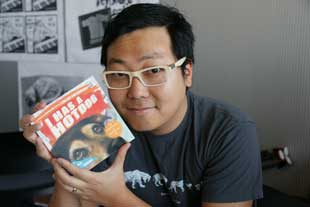
Maryana Ferguson/Maria Popova
For years, Maria Popova’s septuagenarian grandmother in Bulgaria wished her granddaughter would just do the sensible thing and get an MBA. Instead, the 27-year-old Brooklynite has spent the past six years developing BrainPickings.org—her wildly popular culture blog where one might find cheeky maps of European stereotypes, a visual history of bicycle design, even a Finnish choir that sets people’s complaints to song. Sometimes, she ties her morsels of “interestingness” to the current of the times—as with a recent series of Occupy-themed posts or her posthumous tribute to Steve Jobs. But often her pickings aim to transcend the times, rather than harping on them, pushing us beyond the thought parameters of our daily routines.
A transplant from Bulgaria, Popova moved to the states to study at the University of Pennsylvania. She graduated with a communications degree, but her current reading proclivities—she consumes 12 to 15 books a week—and her prolific Twitter word-smithing—she tweets, without fail, every 15 minutes—are a dead giveaway to the one-time English major that lies within. (Never one to make curiosity compromises, Popova ditched the major. Read on to learn why.) Since Brain Pickings‘ launch in 2006, the site has earned millions of page views, as well as side gigs for Popova as a culture writer for The Atlantic, Wired UK, GOOD, and Nieman Lab. So while there’s no MBA in sight, grandma is jiving with Popova’s unconventional brand of business savvy. I caught up with the one-woman discovery engine to learn about the internet’s hidden treasures, curation as authorship, and her occasional run-ins with immigration services.
Mother Jones: So on top of your prodigious Twitter presence, you blog three times a day. And each item you blog about is a stunning hidden gem that would take the average netizen hours to track down. How do you do it? Can you run me through your typical day?
Maria Popova: The Atlantic actually asked me that for their media diet thing. The writer basically told me he was terrified of me! So, besides Brain Pickings I also have a day job, which enables me to be here, you know, to have a paycheck. Half of the time, I work out of Studiomates, which is a wonderful coworking space that my friend Tina runs. Then the other half of the time I’m at TBWA [an advertising company]. So depending on the day, my schedule is different. But, generally speaking, I get up in the morning, I do a 30 to 45 minute prescheduling of tweets and just seeing if there’s anything urgent—do-or-die emails or server outages, stuff like that. Then after that I go to the gym, where I do all my long-form reading—so Instapaper, and all the Kindle books. I go through an embarrassing amount of books per week.
MJ: How many?
MP: To be fair some of them are art, design, or photography books that you don’t really read so much as look at. But most weeks I’ve gone through 12 books, maybe even 15 some weeks, depending on the length. So I go through my long form, and then my day begins. I usually try to do most of my writing earlier in the day because I sort of lump out later on. So everyday I publish three pieces on Brain Pickings, so I try to write two of them before the early afternoon. And then I do all the prescheduling of tweets for the rest of the day. And then, I do yoga in the evening—or if I have to go to some event. Then when I get home I write the third piece on Brain Pickings, I do some reading of news sources, and I preschedule the tweets for the first half of the following day. And then I do some more book reading before I go to bed.
MJ: You’re so embedded in multiple technologies. What would you say is a technological void that needs filling?
MP: Universal WiFi. Without a doubt. I am done with being on the train, not having internet. Or having spotty coverage. It’s a fundamental need at this point. It’s the frickin’ information age! It should be like air! And it doesn’t have to be free. I’m a believer in paying for value. Just having it as an option.
MJ: Have you always been so committed to information consumption?
MP: Well, it’s an interesting thing. I didn’t really—at least intellectually and creatively—have a particularly compelling experience in college. But during my junior year, they made the TED talks public. So I started listening to them. They were producing one per day, and I was listening to one per day, every day, at the gym. And then I discovered PopTech and other kind of intellectualish, online portals for curiosity. Very quickly, I just got so much more out of those than from so-called “Ivy League” education that I knew it was on me to keep myself stimulated, and to keep learning, more than anything. And, because I paid my way through college, I was working at Penn, two to four jobs at a time to pay for school.
MJ: And in the middle of all this, you also found time to start Brain Pickings?!
MP: [Laughs.] It was crazy, crazy times. Well, one of my jobs was at a start-up ad agency. They were trying to do things differently, work with socially conscious clients, and to really be a more creative take on advertising than the industry itself. But I noticed that what the guys at the office were circulating for inspiration still came from within the ad industry. I thought that was really counterintuitive—to only borrow inspiration from within your own industry. So I started Brain Pickings as just a Friday email newsletter going out to my colleagues there, with five links to five really different things that had nothing to do with advertising—from a vintage train map of Europe to a Japanese short film from 1920 to the latest technology. Eventually I saw that these guys were forwarding these emails to friends of theirs that were in really different disciplines, not just creative ones—but writers, lawyers, students, whatever. So, I decided on top of all the jobs and school, to take a night class and teach myself web design and coding, just enough to get by. That’s how it started. And in the process, I was still digging into the things I was featuring, and in that process, you learn so much more than you do in a lecture. The whole lifelong-learner thing—this just became my way of doing that.
MJ: So when you’re wading through the interwebs looking for content, what’s the thing you sense that tells you “Done. This works for Brain Pickings?”
MP: What I pick for my blog and what I pick for Twitter are different things. One thing that is true for both, by and large, is that it has to feel like something that leaves you with more than just a moment of gawking. There are really cool or funny videos, or visually stunning photos, and that’s fine, but none of them really give you more when you close that tab, you know? I try to find stuff that a little bit, in a tiny way changes how you see something about the world. With Brain Pickings, especially, whenever I look at a piece of content. I think “Can I add something to it? Can I add some depth and context and background to really make it worth featuring?” Or do I just do what Jeff Jarvis calls “do-what-you-do-best-and-link-to-the-rest,” and just tweet it instead? That’s always the litmus test. Is there something that I can say. If I can pull in pieces of older content or something else that connects different disciplines or different ideologies, then I will write an article about it.
MJ: How does your family feel about what you’re doing?
MP: I was actually just talking to my 75-year-old grandmother in Bulgaria on Skype yesterday. I just taught a class at Columbia, at their MBA school—they asked me to be a guest speaker. My grandmother has always had a real problem with the fact that I never went and got an MBA, and I’ve been trying all this time to explain to her that I have learned so much more in the past six years doing this. So finally, the other day, when I was telling her about Columbia, it really dawned on her that because of how I’ve structured my intellectual curiosity, they’re asking me to go and talk to MBAs. I think she really began to understand alternative ways of learning and growing.
MJ: If your 75-year-old grandma is into it, you’re doing something right!
MP: Well, also—she discovered the internet a year and a half ago. And she’s obsessed! Now she keeps track of things I don’t keep track of! Like the Brain Pickings Facebook fan page; she keeps score of fans. And my followers on Twitter; every time she’s like, “Oh, you’re up to so-and-so now!” And then she has all these Google Alerts that I helped her set up with Google Translate to see what people are saying about Brain Pickings and me, in the major media or whatever. She is so cute. She knows more about what I do than my parents.
MJ: Are your parents more understanding on the career front?
MP: They’re supportive. To this day, I’m not quite sure how understanding they are. I know they try. My dad, definitely, from a technical perspective, understands everything about the social web, and all of that. From a conceptual standpoint, I wonder if he still thinks what I do isn’t quite real, in the way that getting a job as a bioengineer might be, you know? And my mom, I know she tries to understand. She can sense that I’m happy with what I do, really fulfilled and scintillated, and I think that’s enough for her.
MJ: So, did you officially immigrate?
MP: Well, actually, funny you should ask. I didn’t immigrate. I’m here on a visa, and I’m not an American citizen. I don’t know if you followed the whole Visagate situation in 2007 and 2008?
MJ: I didn’t. What happened?
MP: Every year, the government has a visa quota—they will give, say, 65,000 H1-B work visas for foreigners who are going to work in the country for an American company. And so, normally, they would open up the application process, and the quota would run out in the first three weeks or so, and then people would not get them. So, after graduation, I had a job, and we applied for that visa, but that was the year “Visagate” happened: The first day of applications, for the first time in history, the government got three times their quota on the very first day. So, they panicked and thought the only thing to do was to make it a raffle for everyone that applied on the first day, and then automatically reject everyone after that. So, we’d filed for the first day, but I was in the two-thirds that didn’t get it, so the whole envelope got returned unopened. So then I got the OPT—which entitles you to a year’s worth of work with a company within the scope of your major. We tried again in 2008, and same thing—the whole envelope got returned unopened. So, I had to leave the country! I went back to Bulgaria for a year. When the application process lightened up, I came back. I moved to LA—which I really resented more than anyone’s ever resented a city in the history of resenting cities. And now I’m finally in New York, and I’m here to stay.
MJ: How did you develop your writing style?
MP: I was, like I believe everyone under the sun, an English major for a while. I had a creative nonfiction concentration. Then, my senior year, there was one class that was required to get the major, and it was something like “Italian Literature 1546-1646.” Something superspecific. I got so annoyed, and I was like “Screw it! I don’t care for the title—I’m just gonna turn it into a minor.” So I never took that damn class! But my major was communications, with a focus on communication and commerce. But I don’t see a correlation between my formal academic background and the way I have built my own curiosity and intellectual interests. It’s just something on paper.
MJ: So if not your academic background, what did inspire Brain Pickings?
MP: Now, I have a term for it, and it’s not even my own—the idea of “combinatorial creativity.” But even before I knew what that was, I always believed that creativity is just, sort of, our ability to take these interesting pieces of stuff that we carry and accumulate over the course of our lives—knowledge and insight and inspiration and other work and other skills—and then recombine them into new things. That’s how innovation happens, and that’s how ideas are born. So, when I started Brain Pickings, the idea of five diverse, multidisciplinary items in one email, that was the fundamental vision for it: that you enrich people with creative resources, and over time, these Lego bricks that end up in their heads eventually build this enormous, incredible castle.* And I don’t think that’s an original idea at all—it’s something a lot of people intuitively understand, and a lot of curatorial projects are born out that vision.
MJ: But if it’s not an original idea…why do you think Brain Pickings has received so much acclaim?
MP: I honestly have no idea! [Laughs.] I really don’t. I never had a business strategy or a growth plan behind it. And to this day, a lot of days I wake up and I still think I’m writing for the eight people that were on my email newsletter in 2005. Part of what is interesting to me about journalism online and content curation, is the intersection of the editorial and the curatorial. I think often that’s what makes the difference and sets certain voices apart. For me, I have the purely curatorial presence on Twitter, but there’s also the editorial part which a lot of Brain Pickings is, but also other places that I write that cover different fringes of culture—Wired UK, Design Observer, Nieman Lab. I think this cross-pollination pulls people in. Opinion is one platform of expression, but opinion channeled through curation is another. The intersection of the two has more traction, in a way, than simply coining.
MJ: Do you get tired? How do you push yourself to sustain your routine on a bad day?
MP: Hah! Beats me! I just do it. That’s how I am. I have bad days. Sometimes I have a lot of bad days. By and large, I think most people fall into a bad mood because they’re able to ruminate on whatever the problem at hand is, and that makes it worse. But when you intercept the rumination process with something that requires your full attention—that’s stimulating and absorbing, that places a demand on your intellectual focus—you don’t get to ruminate. In a way, it’s a mental health aid to be able to do that so much. My routine, what I do, it just feels like home. It’s my comfort food.
Correction: An earlier version of this article misquoted Popova as saying capsule instead of castle.
Below, check out 10 sample tweets from @brainpicker:
















